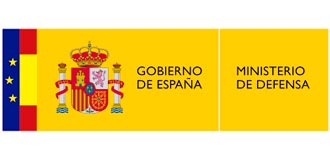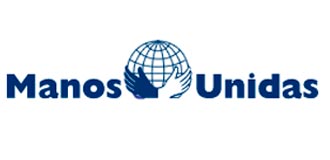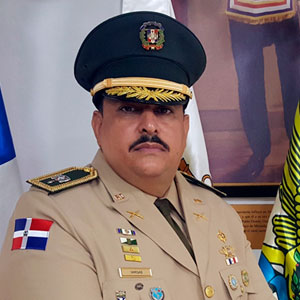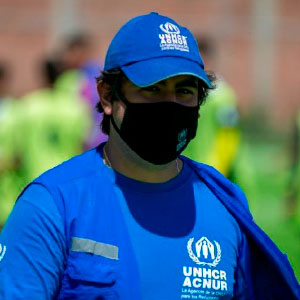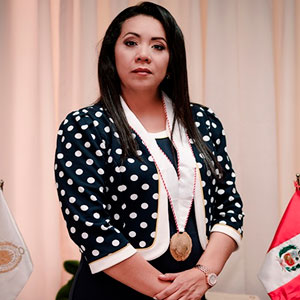Master's Degree in International Humanitarian Law, Human Rights and Operational Law
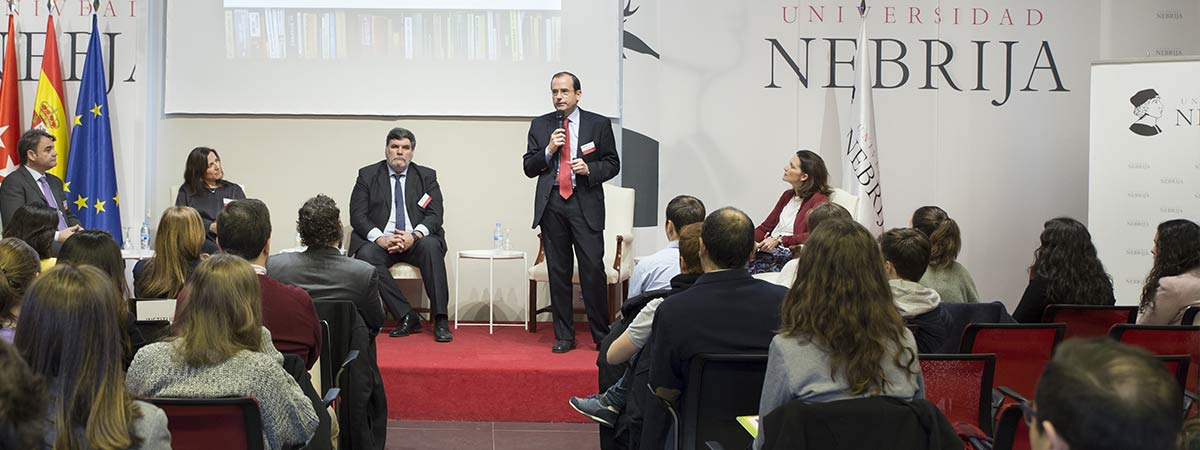
Master's degree specialized in social practices such as teaching, politics and the judiciary
The Master's Degree in International Humanitarian Law, Human Rights and Operational Law is the only Official Master's Degree in Spain that trains students in Operational Law and its fusion with International Humanitarian Law and Human Rights for the legal regulation of armed conflicts.
The regulation of armed conflicts is mandatory knowledge for legal advisors who operate in conflict spaces, since a wide range of military humanitarian law is contemplated, as well as the international law of conflicts. It is worth noting the need for knowledge of International Humanitarian Law to advise various organizations regarding international crises that occur throughout the world, and at the center of which are human beings.
The program's professors maintain a relationship of academic cooperation with various international organizations such as the United Nations, the European Security Council, the Inter-American Defense Board and various institutions linked to the areas of global, strategic, military security and defense and security forces; therefore, they are actively working in the fields they teach.
The program is taught in the "Classroom Attendance" an "online" modalities, so that students have the possibility of making their work and personal activities compatible with studying in the program.
The first official program in Spain to train students in operational law, combining International Humanitarian Law and Human Rights as tools for conflict management.
Graduate profileA professional knowledgeable of theoretical, legal, political and cultural practices and elements related to international human rights law.
The graduate must be able to get along -in terms of Human Rights- in different social practices: from teaching to the practice of politics and the judiciary, going through those related to the planning, formulation and execution of public policies, consultancy firms and practicing the profession.
The Master's Degree in International Humanitarian Law, Human Rights and Operational Law promotes social sensitivity in all its graduates, citizen culture and the awareness that the best legitimacy of any democracy lies in the guarantee and protection of Human Rights and International Law.
Official Degree:Master's Degree in International Humanitarian Law, Human Rights and Operational Law
Center responsible:School of Law and International Relations
Total Credits:60 credits.
Minimum of 12 ECTS credits and maximum of 60 ECTS credits per enrollment and academic period.
Branch of knowledge: Social Sciences
Openings available: 30 in the classroom attendance mode
30 in the blended mode
75 in online mode
Academic year in which it was implemented: 2017-2018
Duration: 1 academic year
Type of Education: Classroom Attendance / Blended / Online
Academic Regulations: General student’s regulations. Credit transfer and recognition. Regulation of student participation. Common procedures for carrying out the Final Research Project
University Services: [+info]
Internal Quality Assurance System System managers Incidents, Suggestions and Complaints Job placement report and assessment of training received
Expert teaching staff, a mix of professionals and academics
Curriculum
BOE No. 168, of July 12, 2018
All our degrees and curricula have been prepared in accordance with the new guidelines set by current legislation, having already been verified by the National Agency for Quality Assessment.
The student must take 60 credits
First Semester30 ECTS
- 6 ECTS | Multiculturalism, globalization and citizenship
- 6 ECTS | Concept and guarantee of Human Rights
- 6 ECTS | International Law of Human Rights and Operational Law
- 6 ECTS | International Humanitarian Law and Operational Law
- 6 ECTS | International Justice and Human Rights
Second Semester30 ECTS
- 6 ECTS | International Law of Armed Conflicts and Operational Law
- 6 ECTS | The international order and the creation of international criminal tribunals. The International Criminal Court
- 6 ECTS | International cooperation in the prevention, prosecution and punishment of international crimes
- 6 ECTS | Professional internships
- 6 ECTS | Final Research Project of the Master's degree
Information of the Subjects
Professors
| Profesores Professors | Porcentaje de Doctores Percentage of PhD holders |
| 52 | 80,76% |
 Giuseppe Kodjack Vii Gangi Guillén
Director del Máster en Derecho Internacional Humanitario, Derechos Humanos y Derecho Operacional
Director of Master's Degree in International Humanitarian Law, Human Rights and Operational Law
Licenciado en Ciencias y Artes militares de la Academia Militar de Venezuela (Mención Honorífica 1996-2001 en la especialidad de Armamento) Máster en DIH, Logística Militar y Gestión de RRHH.
Giuseppe Kodjack Vii Gangi Guillén
Director del Máster en Derecho Internacional Humanitario, Derechos Humanos y Derecho Operacional
Director of Master's Degree in International Humanitarian Law, Human Rights and Operational Law
Licenciado en Ciencias y Artes militares de la Academia Militar de Venezuela (Mención Honorífica 1996-2001 en la especialidad de Armamento) Máster en DIH, Logística Militar y Gestión de RRHH. Profesor titular de la Facultad de Derecho y de Relaciones Internacionales de la Universidad Antonio Nebrija, Director del Master Universitario en Derecho Internacional Humanitario, Derechos Humanos y Derecho Operacional; investigador del programa doctoral en “Seguridad y Análisis de Riesgos y Conflictos”; Coordinador Académico del Departamento de Seguridad y Defensa y profesor colaborador del curso “Observadores en Misiones de Paz” de la Escuela de Guerra del Ejército de Tierra de España.
 Antonio Nicolás Marchal Escalona
Doctor en Derecho. Licenciado en Derecho. Coronel de la Guardia Civil, docente con más de 25 años de experiencia.
Antonio Nicolás Marchal Escalona
Doctor en Derecho. Licenciado en Derecho. Coronel de la Guardia Civil, docente con más de 25 años de experiencia.
 Manuel González Hernández
Teniente Coronel de artillería. Profesor de Geopolítica en el área de Relaciones Internacionales, Concienciación Cultural, Mapa de Religiones, Islam y Conflictos Religiosos del Departamento de Estrategia y Organización de la Escuela de Guerra del Ejército. En el ámbito civil colaboro con diferentes instituciones y universidades. Autor de diferentes artículos y componente de la Misión de Estabilización Bosnia-Herzegovina 2001 y de la Unidad de Apoyo Terminal a operaciones exteriores en el 2002. Doctorando en la Universidad de Granada Mis campos de trabajo son: la concienciación e inteligencia cultural, historia y polemología de las religiones y terrorismo Yihadista.. Profesor del Departamento de Estrategia y Organización de la Escuela de Guerra del Ejército.
Manuel González Hernández
Teniente Coronel de artillería. Profesor de Geopolítica en el área de Relaciones Internacionales, Concienciación Cultural, Mapa de Religiones, Islam y Conflictos Religiosos del Departamento de Estrategia y Organización de la Escuela de Guerra del Ejército. En el ámbito civil colaboro con diferentes instituciones y universidades. Autor de diferentes artículos y componente de la Misión de Estabilización Bosnia-Herzegovina 2001 y de la Unidad de Apoyo Terminal a operaciones exteriores en el 2002. Doctorando en la Universidad de Granada Mis campos de trabajo son: la concienciación e inteligencia cultural, historia y polemología de las religiones y terrorismo Yihadista.. Profesor del Departamento de Estrategia y Organización de la Escuela de Guerra del Ejército.
 Ana Maria Sanchez Diaz
Dra. Ana Maria Sanchez Diaz. Doctora en Derecho y Letrada Habilitada del Servicio Jurídico del Estado, Master Universitario en Paz, Seguridad y Defensa por el Instituto Universitario “Gutierrez Mellado” y Licenciada en Derecho de la Universidad de Murcia en 1993.
Es la docente responsable de la impartición de la asignatura de Derecho Internacional Humanitario y Derecho Operacional.
Ana Maria Sanchez Diaz
Dra. Ana Maria Sanchez Diaz. Doctora en Derecho y Letrada Habilitada del Servicio Jurídico del Estado, Master Universitario en Paz, Seguridad y Defensa por el Instituto Universitario “Gutierrez Mellado” y Licenciada en Derecho de la Universidad de Murcia en 1993.
Es la docente responsable de la impartición de la asignatura de Derecho Internacional Humanitario y Derecho Operacional.
 Maria del Valle Lopez Alfranca
Licenciada en Derecho y Teniente Coronel Auditor del Cuerpo Jurídico Militar, donde ingresó por oposición en el año 1995. Ha estado destinada en la Asesoría Jurídica de la Delegación de Defensa de Santa Cruz de Tenerife (1996-1998), como Secretario Relator del Juzgado Togado Militar Territorial nº 21 de Sevilla (1998-2001), en la Subdirección General de Personal Militar (2001- 2007), en la Unidad de Consejo de Ministros del Ministerio de Defensa (2007- 2011), como Jefe de Estudios de la Escuela Militar de Estudios Jurídicos (2011- 2014), y como Consejera Técnica en el Gabinete del Subsecretario de Defensa (2014.2018). En la actualidad está destinada en la Asesoría Jurídica de la Dirección General de Armamento y Material.
Es miembro de la Asociación Española de Derecho Militar y de los Conflictos Armados; profesora asociada en la Escuela Militar de Estudios Jurídicos y colaboradora del Instituto Internacional de Derecho Humanitario de Sanremo; Italia.
Maria del Valle Lopez Alfranca
Licenciada en Derecho y Teniente Coronel Auditor del Cuerpo Jurídico Militar, donde ingresó por oposición en el año 1995. Ha estado destinada en la Asesoría Jurídica de la Delegación de Defensa de Santa Cruz de Tenerife (1996-1998), como Secretario Relator del Juzgado Togado Militar Territorial nº 21 de Sevilla (1998-2001), en la Subdirección General de Personal Militar (2001- 2007), en la Unidad de Consejo de Ministros del Ministerio de Defensa (2007- 2011), como Jefe de Estudios de la Escuela Militar de Estudios Jurídicos (2011- 2014), y como Consejera Técnica en el Gabinete del Subsecretario de Defensa (2014.2018). En la actualidad está destinada en la Asesoría Jurídica de la Dirección General de Armamento y Material.
Es miembro de la Asociación Española de Derecho Militar y de los Conflictos Armados; profesora asociada en la Escuela Militar de Estudios Jurídicos y colaboradora del Instituto Internacional de Derecho Humanitario de Sanremo; Italia.
 Mario Lanz Raggio
Licenciado en Derecho y en Ciencias Jurídicas por la Universidad Pontificia de Comillas (ICADE) en 1991 y Diplomado en Relaciones Internacionales por la Sociedad de Estudios Internacionales. Es Teniente Coronel Auditor del Cuerpo Jurídico Militar, donde ingresó por oposición en el año 1993. Ha estado destinado en la Asesoría Jurídica de la Zona Marítima de Canarias (1994-1999), en el Servicio Militar de Construcciones como Asesor Jurídico Jefe (1999-2005), en la Asesoría Jurídica General del Ministerio de Defensa (2005-2015) y en el Tribunal Militar Territorial Primero de Madrid (2015-2017- En la actualidad se encuentra destinado en la Fiscalía Togada.
Mario Lanz Raggio
Licenciado en Derecho y en Ciencias Jurídicas por la Universidad Pontificia de Comillas (ICADE) en 1991 y Diplomado en Relaciones Internacionales por la Sociedad de Estudios Internacionales. Es Teniente Coronel Auditor del Cuerpo Jurídico Militar, donde ingresó por oposición en el año 1993. Ha estado destinado en la Asesoría Jurídica de la Zona Marítima de Canarias (1994-1999), en el Servicio Militar de Construcciones como Asesor Jurídico Jefe (1999-2005), en la Asesoría Jurídica General del Ministerio de Defensa (2005-2015) y en el Tribunal Militar Territorial Primero de Madrid (2015-2017- En la actualidad se encuentra destinado en la Fiscalía Togada.
 Dr. Manuel José Iglesias
Doctor en Derecho mención Cum Laude, Licenciado en Derecho, Master en Ciencias Policiales, Especialización Policial, Criminalística, Negociador para situaciones de toma de rehenes por la Guardia Civil de España y profesor del Curso de Especialistas en Policía Judicial del Centro de Perfeccionamiento de la Guardia Civil de España.
Responsable por la impartición de la docencia en la asignatura de El Ordenamiento Internacional y la creación de los Tribunales Penales Internacionales. La Corte Penal Internacional.
Dr. Manuel José Iglesias
Doctor en Derecho mención Cum Laude, Licenciado en Derecho, Master en Ciencias Policiales, Especialización Policial, Criminalística, Negociador para situaciones de toma de rehenes por la Guardia Civil de España y profesor del Curso de Especialistas en Policía Judicial del Centro de Perfeccionamiento de la Guardia Civil de España.
Responsable por la impartición de la docencia en la asignatura de El Ordenamiento Internacional y la creación de los Tribunales Penales Internacionales. La Corte Penal Internacional.
 José María Bautista Samaniego
Doctor en Derecho por la Universidad Autónoma de Madrid. Breve currículum académico y/o investigador: Licenciado y Doctor en Derecho por la Universidad Autónoma de Madrid .Técnico Urbanista (INAP).Máster en Derecho y Administración Local por la Universidad Autónoma de Madrid. Curso de Derecho Inmobiliario Privado en la Escuela de Práctica Jurídica Universidad Complutense de Madrid (año académico).
José María Bautista Samaniego
Doctor en Derecho por la Universidad Autónoma de Madrid. Breve currículum académico y/o investigador: Licenciado y Doctor en Derecho por la Universidad Autónoma de Madrid .Técnico Urbanista (INAP).Máster en Derecho y Administración Local por la Universidad Autónoma de Madrid. Curso de Derecho Inmobiliario Privado en la Escuela de Práctica Jurídica Universidad Complutense de Madrid (año académico). Investigador relacionado: Derechos fundamentales y libertades púbicas en las Reales Ordenanzas para las Fuerzas Armadas. El militar ante la función pública: estudio de la Ley 17/1989, de 19 de julio, reguladora del régimen del personal militar profesional. Plazos para la solicitud del derecho de reversión. El derecho de reversión a la luz de la Ley 38/1999, de 5 de noviembre, de Ordenación de la Educación. Urbanismo y Defensa Nacional. Breve currículum profesional: Cuerpo Jurídico Militar, con destino actual en la Asesoría Jurídica General del Ministerio de Defensa. Con anterioridad: Subdirector General de Patrimonio e Inventario del Ayuntamiento de Madrid. Asesor Jurídico Jefe de la Gerencia de Infraestructura y Equipamiento del Ministerio de Defensa (Hoy INVIED).Secretaría General Técnica del Ministerio de Defensa (Unidad de Estudios Jurídicos).
 Ana Quintana Jiménez
Doctora en Turismo por la Universidad Nebrija, y Licenciada en Derecho por la Universidad de Alcalá. En la actualidad desempeña las funciones de Coordinadora del Master en Turismo, del Doctorado en Turismo, y es Directora del grado presencial en Derecho de la Universidad Nebrija. Compagina la investigación con la docencia en el área de grado y posgrado de la Universidad Antonio de Nebrija.
Ana Quintana Jiménez
Doctora en Turismo por la Universidad Nebrija, y Licenciada en Derecho por la Universidad de Alcalá. En la actualidad desempeña las funciones de Coordinadora del Master en Turismo, del Doctorado en Turismo, y es Directora del grado presencial en Derecho de la Universidad Nebrija. Compagina la investigación con la docencia en el área de grado y posgrado de la Universidad Antonio de Nebrija.
 Adrián Nicolás Marchal González
Doctor en Derecho por la Universidad de Castilla La-Mancha, Licenciado en Derecho por la Universidad Carlos III de Madrid, Licenciado en Criminología por la Universidad Camilo José Cela, Máster en Derechos Fundamentales por la Universidad Nacional de Educación a Distancia. Diplomado en Policía Judicial por la Universidad Nacional de Educación a Distancia. Abogado en ejercicio colegiado en el Ilustre Colegio de Abogados de Madrid, especializado en Derecho Penal y nuevas tecnologías. Profesor en el Máster en Criminalística y en el Grado en Criminología y Seguridad de la Universidad Camilo José Cela, profesor del Grado en Criminología de la Universidad Europea Miguel de Cervantes, profesor-tutor del Grado en Criminología de la Universidad Nacional de Educación a distancia, en la actualidad ejercer como profesor en los Grados en Seguridad y Derecho de la Universidad Antonio de Nebrija, ostentando el cargo de Director del Grado en Seguridad. Colaborador habitual en diferentes medios de comunicación, ha publicado diversos artículos en el ámbito del Derecho Penal, Criminología y Política Criminal.
Adrián Nicolás Marchal González
Doctor en Derecho por la Universidad de Castilla La-Mancha, Licenciado en Derecho por la Universidad Carlos III de Madrid, Licenciado en Criminología por la Universidad Camilo José Cela, Máster en Derechos Fundamentales por la Universidad Nacional de Educación a Distancia. Diplomado en Policía Judicial por la Universidad Nacional de Educación a Distancia. Abogado en ejercicio colegiado en el Ilustre Colegio de Abogados de Madrid, especializado en Derecho Penal y nuevas tecnologías. Profesor en el Máster en Criminalística y en el Grado en Criminología y Seguridad de la Universidad Camilo José Cela, profesor del Grado en Criminología de la Universidad Europea Miguel de Cervantes, profesor-tutor del Grado en Criminología de la Universidad Nacional de Educación a distancia, en la actualidad ejercer como profesor en los Grados en Seguridad y Derecho de la Universidad Antonio de Nebrija, ostentando el cargo de Director del Grado en Seguridad. Colaborador habitual en diferentes medios de comunicación, ha publicado diversos artículos en el ámbito del Derecho Penal, Criminología y Política Criminal.
 Jessica Bayón Pérez
Doctora en Ciencias Sociales con especialidad en Recursos Humanos. Recientemente galardonada con la Medalla de Oro al Mérito del Trabajo por la Asociación Europea de Economía y Competitividad. Trayectoria profesional enfocada en Recursos Humanos en el ámbito Sociosanitario. Mejor expediente académico del Grado en Relaciones Laborales y Recursos Humanos con mención en asesoría de empresa, le faculta a postular el premio a nivel nacional de trayectoria académica por el Ministerio de Educación, Cultura y Deporte. Autora de contenidos en el área de empresa: Dirección estratégica de Empresa, Cultura Empresarial y Dirección y Gestión de aeropuertos. Trayectoria en diferentes Universidades en el ámbito Jurídico y Recursos Humanos.
Jessica Bayón Pérez
Doctora en Ciencias Sociales con especialidad en Recursos Humanos. Recientemente galardonada con la Medalla de Oro al Mérito del Trabajo por la Asociación Europea de Economía y Competitividad. Trayectoria profesional enfocada en Recursos Humanos en el ámbito Sociosanitario. Mejor expediente académico del Grado en Relaciones Laborales y Recursos Humanos con mención en asesoría de empresa, le faculta a postular el premio a nivel nacional de trayectoria académica por el Ministerio de Educación, Cultura y Deporte. Autora de contenidos en el área de empresa: Dirección estratégica de Empresa, Cultura Empresarial y Dirección y Gestión de aeropuertos. Trayectoria en diferentes Universidades en el ámbito Jurídico y Recursos Humanos.
 Gema Alejandra Garcia Botana
Directora de Desarrollo de Negocio Wolters Kluwer Formación Catedrática de Derecho Civil. Doctora en Derecho y profesora en distintos centros universitarios.
Gema Alejandra Garcia Botana
Directora de Desarrollo de Negocio Wolters Kluwer Formación Catedrática de Derecho Civil. Doctora en Derecho y profesora en distintos centros universitarios.
 Jordi Regí Rodríguez
Doctor en Derecho por la Universidad Nebrija. Diploma de Estudios Avanzados en Derecho Comunitario por la Universidad Nebrija. Licenciado en Derecho por la Universidad de Barcelona. Académico Correspondiente de la Real Academia de Jurisprudencia y Legislación.
Jordi Regí Rodríguez
Doctor en Derecho por la Universidad Nebrija. Diploma de Estudios Avanzados en Derecho Comunitario por la Universidad Nebrija. Licenciado en Derecho por la Universidad de Barcelona. Académico Correspondiente de la Real Academia de Jurisprudencia y Legislación. Ha trabajado durante 15 años como Asesor de la Presidencia de la Comunidad de Madrid en el Área de Asuntos Europeos donde realizaba informes de compatibilidad de las ayudas de estado con el Derecho Comunitario, el seguimiento y coordinación de los procedimientos de infracción de la UE y funciones de coordinación y protocolo de su área.
Ha realizado publicaciones sobre diversos temas relacionados con la Unión Europea, ha asistido a conferencias y congresos tanto nacionales e internacionales sobre la temática y también sobre el modelo de enseñanza elearning de la Universidad.
Ha sido Tutor de Practicum de la Universidad Carlos III y de la Universidad Autónoma de Madrid, además de profesor honorario de ésta última. Ha sido Tutor de Prácticas de Derecho Constitucional en la Universidad de Barcelona y profesor del módulo de régimen jurídico de la Comunidad de Madrid.
Actualmente es Director del Master Universitario de Acceso a la Abogacía, Coordinador del área de Derecho Internacional y Derecho de la UE y Coordinador del Master en Ciberdelincuencia en la Universidad Nebrija.
 José Luis Cruz Beltrán
Doctorando en Paz, Seguridad y Defensa Internacionales, Master in Administrative Law (LLM), Licenciado en Derecho e Historia, Postgrado Especialista Universitario en Servicios de Inteligencia, Especialista Universitario en Dirección de Seguridad Integral, Experto Universitario en Mediación Civil y Mercantil, Técnico Superior Universitario Tutor e-learning y Diplomado en Altos Estudios Internacionales. Ha sido profesor colaborador visitante en diversas universidades y centros de formación, así como responsable del curso oficial “ad hoc” de Mediación Civil y Mercantil para Censores Jurados de Cuentas del Colegio de Catalunya impartido por la Universidad de Alcalá y el CEJM “Centro de Estudios Jurídicos y Mercantiles”.
José Luis Cruz Beltrán
Doctorando en Paz, Seguridad y Defensa Internacionales, Master in Administrative Law (LLM), Licenciado en Derecho e Historia, Postgrado Especialista Universitario en Servicios de Inteligencia, Especialista Universitario en Dirección de Seguridad Integral, Experto Universitario en Mediación Civil y Mercantil, Técnico Superior Universitario Tutor e-learning y Diplomado en Altos Estudios Internacionales. Ha sido profesor colaborador visitante en diversas universidades y centros de formación, así como responsable del curso oficial “ad hoc” de Mediación Civil y Mercantil para Censores Jurados de Cuentas del Colegio de Catalunya impartido por la Universidad de Alcalá y el CEJM “Centro de Estudios Jurídicos y Mercantiles”.
 Carlos Espaliu Berdud
Carlos Espaliú, nuevo investigador principal del Grupo Nebrija de Seguridad, Gestión de Riesgos y Conflictos de la Facultad de Derecho y de Relaciones Internacionales. Licenciado en Derecho y doctor en Derecho Internacional Público por la Universidad de Córdoba, Espaliú está acreditado como catedrático de universidad. A lo largo de su trayectoria profesional, ha impartido docencia en varias universidades y ha sido vicedecano en la Universidad Internacional de Cataluña. Destaca por su labor de investigación, con 52 publicaciones científicas y su participación en 8 proyectos de investigación competitivos, acumulando el reconocimiento de varios sexenios de investigación.
Carlos Espaliu Berdud
Carlos Espaliú, nuevo investigador principal del Grupo Nebrija de Seguridad, Gestión de Riesgos y Conflictos de la Facultad de Derecho y de Relaciones Internacionales. Licenciado en Derecho y doctor en Derecho Internacional Público por la Universidad de Córdoba, Espaliú está acreditado como catedrático de universidad. A lo largo de su trayectoria profesional, ha impartido docencia en varias universidades y ha sido vicedecano en la Universidad Internacional de Cataluña. Destaca por su labor de investigación, con 52 publicaciones científicas y su participación en 8 proyectos de investigación competitivos, acumulando el reconocimiento de varios sexenios de investigación.
 Daniel Berzosa López
Experto en Derecho Público, Civil y Mercantil, Procesal y Arbitraje, y Fundaciones.
Daniel Berzosa López
Experto en Derecho Público, Civil y Mercantil, Procesal y Arbitraje, y Fundaciones. Desde 1999, ha desarrollado la asesoría jurídica institucional tanto de entidades de carácter civil y mercantil, como de relevancia pública y fundaciones, y de personas físicas; así como la atención y llevanza de asuntos contenciosos de especial complejidad, referidos en especial a los ámbitos de las actividades financieras, inmobiliarias, de telefonía, de servicios y de explotación de productos de consumo. En paralelo, ha impartido docencia universitaria de grado y postgrado.
 Begoña Lluva Rivera
Profesor del área de Derecho y Seguridad. Procurador de los Tribunales y con despacho propio desde el año 1993. Mediadora Familiar, Civil, Mercantil y Tráfico. Doctor en Derecho por la UNED en el año 2000.
Begoña Lluva Rivera
Profesor del área de Derecho y Seguridad. Procurador de los Tribunales y con despacho propio desde el año 1993. Mediadora Familiar, Civil, Mercantil y Tráfico. Doctor en Derecho por la UNED en el año 2000.
 Ignacio Matalobos
Licenciado en Derecho por la Universidad de Alcalá de Henares, Coronel del Ejército del Aire, Diplomado de Estado Mayor y experto en Relaciones Internacionales y Logística. Ha permanecido expatriado 10 años ocupando distintos puestos de trabajo y destinos en la Federación de Rusia, Arabia Saudita y Oriente Medio, y los EE.UU. Tiene una amplia formación en idiomas hablando fluidamente el ruso e inglés, en el campo de la Logística de Abastecimiento y en las aéreas de Inteligencia y Operaciones militares en el exterior.
Ignacio Matalobos
Licenciado en Derecho por la Universidad de Alcalá de Henares, Coronel del Ejército del Aire, Diplomado de Estado Mayor y experto en Relaciones Internacionales y Logística. Ha permanecido expatriado 10 años ocupando distintos puestos de trabajo y destinos en la Federación de Rusia, Arabia Saudita y Oriente Medio, y los EE.UU. Tiene una amplia formación en idiomas hablando fluidamente el ruso e inglés, en el campo de la Logística de Abastecimiento y en las aéreas de Inteligencia y Operaciones militares en el exterior.
 Sonia Boulos
Doctora en Derecho internacional por la Universidad de Notre Dame, Estados Unidos (con una beca Fulbright). Por la misma Universidad Notre Dame, Máster en Derecho internacional Humanitario. Licenciada en Derecho por la Universidad de Haifa, Israel. Ha trabajado en la Asociación para los Derechos civiles en Israel y en la organización de Derechos Humanos REDRESS, en Londres, Reino Unido, entre otras organizaciones. Ha publicado como autora y coautora diversas obras sobre su línea de investigación: el régimen internacional de los Derechos Humanos y el Derecho Humanitario en general. Ha sido profesora en la Universidad de Haifa, Israel.
Sonia Boulos
Doctora en Derecho internacional por la Universidad de Notre Dame, Estados Unidos (con una beca Fulbright). Por la misma Universidad Notre Dame, Máster en Derecho internacional Humanitario. Licenciada en Derecho por la Universidad de Haifa, Israel. Ha trabajado en la Asociación para los Derechos civiles en Israel y en la organización de Derechos Humanos REDRESS, en Londres, Reino Unido, entre otras organizaciones. Ha publicado como autora y coautora diversas obras sobre su línea de investigación: el régimen internacional de los Derechos Humanos y el Derecho Humanitario en general. Ha sido profesora en la Universidad de Haifa, Israel.
 Rafael Matamoros Martínez
Licenciado y Doctor en Derecho. General Togado de las Fuerzas Armadas. Presidente del Tribunal Central de Justicia Militar Profesor de Derecho Operativo de la Escuela Militar de Estudios Jurídicos.
Rafael Matamoros Martínez
Licenciado y Doctor en Derecho. General Togado de las Fuerzas Armadas. Presidente del Tribunal Central de Justicia Militar Profesor de Derecho Operativo de la Escuela Militar de Estudios Jurídicos.
 Eduardo Juarez Valero
Doctor en Historia por la UNED, es profesor del Departamento de Biblioteconomía y Documentación de la Universidad Carlos III de Madrid, profesor de la Fundación Ortega y Gasset, profesor titular de Cultura y Civilización Españolas en GEO España (Programa de la University of Oregon), profesor de Paleografía y Diplomática del Curso de Archivística del Instituto Universitario General Gutiérrez Mellado-UNED, profesor-tutor del Máster La España Contemporánea en el Contexto Internacional del Departamento de Historia Contemporánea en la Facultad de Geografía e Historia de la UNED, profesor del curso Conservación Preventiva de documentos, libros y material gráfico del Instituto Universitario General Gutiérrez-UNED y ha sido profesor de Historia de España en el programa de verano de la Georgia Southern University en Segovia durante cinco años. Desde 2007 es presidente del Centro de Investigación de la Guerra Civil Española (CIGCE), del que es su Investigador Principal.
Eduardo Juarez Valero
Doctor en Historia por la UNED, es profesor del Departamento de Biblioteconomía y Documentación de la Universidad Carlos III de Madrid, profesor de la Fundación Ortega y Gasset, profesor titular de Cultura y Civilización Españolas en GEO España (Programa de la University of Oregon), profesor de Paleografía y Diplomática del Curso de Archivística del Instituto Universitario General Gutiérrez Mellado-UNED, profesor-tutor del Máster La España Contemporánea en el Contexto Internacional del Departamento de Historia Contemporánea en la Facultad de Geografía e Historia de la UNED, profesor del curso Conservación Preventiva de documentos, libros y material gráfico del Instituto Universitario General Gutiérrez-UNED y ha sido profesor de Historia de España en el programa de verano de la Georgia Southern University en Segovia durante cinco años. Desde 2007 es presidente del Centro de Investigación de la Guerra Civil Española (CIGCE), del que es su Investigador Principal.
 María del Carmen Ariñez Fernandez
Es Licenciada en Medicina y Cirugía por la Universidad Complutense de Madrid (1981)., ejerce como médico militar de carrera desde 1994, es especialista en medicina preventiva y salud pública por el Hospital Central de la Defensa tiene un Master en Salud Pública por la Escuela Nacional de Sanidad, Doctora en Epidemiología y Salud Pública por la Universidad Rey Juan Carlos y curso superior de inteligencia de las fas. VIII Curso Superior de Inteligencia de las FAS.
Como docente Universitaria es Profesora Asociada Licenciatura Ciencias Ambientales en la Universidad Rey Juan Carlos de Madrid, ha colaborado con el Plan Nacional de SIDA impartiendo charlas relativas a la Prevención de la Infección por VIH en el Ámbito Militar, y ha ejercido múltiples colaboraciones como docente en la Escuela Militar de Sanidad en Cursos de Observadores de Paz.
María del Carmen Ariñez Fernandez
Es Licenciada en Medicina y Cirugía por la Universidad Complutense de Madrid (1981)., ejerce como médico militar de carrera desde 1994, es especialista en medicina preventiva y salud pública por el Hospital Central de la Defensa tiene un Master en Salud Pública por la Escuela Nacional de Sanidad, Doctora en Epidemiología y Salud Pública por la Universidad Rey Juan Carlos y curso superior de inteligencia de las fas. VIII Curso Superior de Inteligencia de las FAS.
Como docente Universitaria es Profesora Asociada Licenciatura Ciencias Ambientales en la Universidad Rey Juan Carlos de Madrid, ha colaborado con el Plan Nacional de SIDA impartiendo charlas relativas a la Prevención de la Infección por VIH en el Ámbito Militar, y ha ejercido múltiples colaboraciones como docente en la Escuela Militar de Sanidad en Cursos de Observadores de Paz.
 Carlos López Gómez
Doctor del Área de Relaciones Internacionales de la Escuela de Derecho y Relaciones Internacionales de la Universidad Antonio de Nebrija. Doctor en Historia por la Universidad Complutense de Madrid. Diploma de Estudios Avanzados y Magíster en Relaciones Internacionales y Comunicación por la Universidad Complutense de Madrid. Licenciado en Historia y Diplomado en estudios de la Unión Europea por la Escuela Diplomática de Madrid. Ha sido investigador invitado en el Instituto Universitario Europeo de Florencia y la Universidad Libre de Bruselas
Carlos López Gómez
Doctor del Área de Relaciones Internacionales de la Escuela de Derecho y Relaciones Internacionales de la Universidad Antonio de Nebrija. Doctor en Historia por la Universidad Complutense de Madrid. Diploma de Estudios Avanzados y Magíster en Relaciones Internacionales y Comunicación por la Universidad Complutense de Madrid. Licenciado en Historia y Diplomado en estudios de la Unión Europea por la Escuela Diplomática de Madrid. Ha sido investigador invitado en el Instituto Universitario Europeo de Florencia y la Universidad Libre de Bruselas
 Mónica Goded Salto
Licenciada en Ciencias Económicas y Empresariales por la Universidad Pontificia Comillas y Doctora en Economía por la Universidad Complutense de Madrid. Ha realizado labores docentes e investigadoras en el ámbito de la economía internacional y el desarrollo en la Universidad San Pablo CEU; en la Universidad de Deusto y en la Universidad Internacional de la Rioja.
Mónica Goded Salto
Licenciada en Ciencias Económicas y Empresariales por la Universidad Pontificia Comillas y Doctora en Economía por la Universidad Complutense de Madrid. Ha realizado labores docentes e investigadoras en el ámbito de la economía internacional y el desarrollo en la Universidad San Pablo CEU; en la Universidad de Deusto y en la Universidad Internacional de la Rioja.
 Susana Raquel De Sousa Ferreira
Doctora en Relaciones Internacionales y Seguridad Internacional por la Universidade NOVA de Lisboa (Portugal) y la UNED (IUGM). Ha recibido el Premio Extraordinario de Doctorado de la UNED, del curso académico 2016/2017, por su tesis de doctorado. Es Profesora Asociada en el Departamento de Relaciones Internacionales de la Universidad Antonio de Nebrija y Directora del Máster Universitario en Gestión de Riesgos en Conflictos. Es investigadora asociada del Instituto Português de Relações Internacionais (IPRI) de la Universidad NOVA de Lisboa, del Grupo de Investigación sobre Políticas Públicas, Seguridad Internacional y Gobernanza Global de la Universidad Europea de Madrid y del Centro de Investigación de Seguridad y Defensa del Instituto de Universitario Militar (IUM) en Portugal. Durante su etapa predoctoral realizó estancias de investigación en el Institute for the Study of International Migration (ISIM) de la Universidad de Georgetown y en el Instituto Universitario General Gutiérrez Mellado de la UNED, con el que mantiene una estrecha colaboración. Sus áreas de investigación son las migraciones internacionales, seguridad internacional, gestión de fronteras, el Mediterráneo, prospectiva y la Unión Europea.
Susana Raquel De Sousa Ferreira
Doctora en Relaciones Internacionales y Seguridad Internacional por la Universidade NOVA de Lisboa (Portugal) y la UNED (IUGM). Ha recibido el Premio Extraordinario de Doctorado de la UNED, del curso académico 2016/2017, por su tesis de doctorado. Es Profesora Asociada en el Departamento de Relaciones Internacionales de la Universidad Antonio de Nebrija y Directora del Máster Universitario en Gestión de Riesgos en Conflictos. Es investigadora asociada del Instituto Português de Relações Internacionais (IPRI) de la Universidad NOVA de Lisboa, del Grupo de Investigación sobre Políticas Públicas, Seguridad Internacional y Gobernanza Global de la Universidad Europea de Madrid y del Centro de Investigación de Seguridad y Defensa del Instituto de Universitario Militar (IUM) en Portugal. Durante su etapa predoctoral realizó estancias de investigación en el Institute for the Study of International Migration (ISIM) de la Universidad de Georgetown y en el Instituto Universitario General Gutiérrez Mellado de la UNED, con el que mantiene una estrecha colaboración. Sus áreas de investigación son las migraciones internacionales, seguridad internacional, gestión de fronteras, el Mediterráneo, prospectiva y la Unión Europea.
 Eugenia Smoktiy Bekhtereva
Doctora Europea Cum Laude en Historia por la Universidad de Alcalá de Henares (Madrid), Licenciada en la Historia Moderna y Contemporánea por la Universidad Estatal de San Petersburgo (Rusia). Experta en la Historia Comparada y la Historia de las Relaciones Internacionales/Historia de Diplomacia por la Universidad de San Petersburgo. Impartía docencia e investigación en Rusia, Francia (EHESS-París), Austria (Institüt für Geschichte, Viena) y España (Universidad de Alcalá, Universidad Rey Juan Carlos Colaboré en los proyectos internacionales de Grado y Máster con University of Arkansas (Fayetteville-USA) y la Universidad Católica Sergio Arboleda (Bogotá-Colombia con la sede en Madrid) Tengo experiencia de más de diez años como coordinadora y co-autora del programa Master Internacional – MBA con Rusia Colaboré en varios diccionarios académicos a nivel nacional como ESPASA-Calpe. Historia de España, etc. Autora de numerosas publicaciones académicas dedicadas a la historia de España y los países del Este europeo
Eugenia Smoktiy Bekhtereva
Doctora Europea Cum Laude en Historia por la Universidad de Alcalá de Henares (Madrid), Licenciada en la Historia Moderna y Contemporánea por la Universidad Estatal de San Petersburgo (Rusia). Experta en la Historia Comparada y la Historia de las Relaciones Internacionales/Historia de Diplomacia por la Universidad de San Petersburgo. Impartía docencia e investigación en Rusia, Francia (EHESS-París), Austria (Institüt für Geschichte, Viena) y España (Universidad de Alcalá, Universidad Rey Juan Carlos Colaboré en los proyectos internacionales de Grado y Máster con University of Arkansas (Fayetteville-USA) y la Universidad Católica Sergio Arboleda (Bogotá-Colombia con la sede en Madrid) Tengo experiencia de más de diez años como coordinadora y co-autora del programa Master Internacional – MBA con Rusia Colaboré en varios diccionarios académicos a nivel nacional como ESPASA-Calpe. Historia de España, etc. Autora de numerosas publicaciones académicas dedicadas a la historia de España y los países del Este europeo
 Álvaro Cremades Guisado
Licenciado en Ciencias Políticas y de la Administración por la Universidad Complutense de Madrid; Máster en Analista de Inteligencia por la Universidad Rey Juan Carlos y la Universidad Carlos III de Madrid; estudiante de Doctorado en Ciencia Política y de la Administración y Relaciones Internacionales por la Universidad Complutense de Madrid. Docente visitante de la Escuela Superior de Guerra “General Rafael Reyes Prieto” (Colombia); profesor invitado en varias universidades españolas e hispanoamericanas (Colombia, Ecuador, Guatemala). Investigador en materia de seguridad internacional, con especial énfasis en inteligencia estratégica.
Álvaro Cremades Guisado
Licenciado en Ciencias Políticas y de la Administración por la Universidad Complutense de Madrid; Máster en Analista de Inteligencia por la Universidad Rey Juan Carlos y la Universidad Carlos III de Madrid; estudiante de Doctorado en Ciencia Política y de la Administración y Relaciones Internacionales por la Universidad Complutense de Madrid. Docente visitante de la Escuela Superior de Guerra “General Rafael Reyes Prieto” (Colombia); profesor invitado en varias universidades españolas e hispanoamericanas (Colombia, Ecuador, Guatemala). Investigador en materia de seguridad internacional, con especial énfasis en inteligencia estratégica.
 Mª Victoria Rodríguez Prieto
Doctora en Ciencias Políticas, área de Relaciones Internacionales (Sobresaliente Cum- Laude, Mención Europea y Premio Extraordinario de Doctorado) por la Universidad Complutense de Madriid. Premio Antonio Truyol y Serra a la mejor tesis doctoral en Relaciones Internacionales concedido por la AEPDIRI. Máster en Relaciones Internacionales y Licenciada en Periodismo por la misma universidad. Desde 2016, es profesora en la Universidad Antonio de Nebrija. Anteriormente, fue beneficiaria de la beca pre-doctoral de Formación de Profesorado Universitario (FPU) en la Facultad de Ciencias Políticas y Sociología, Universidad Complutense de Madrid. Ha sido investigadora visitante en prestigiosos centros extranjeros, tales como Brussels School of International Studies, University of Kent (Bélgica) o Universiteit van Amsterdam (Holanda). Autora de numerosas publicaciones y miembro de grupos de investigación. Actualmente directora del Máster en Relaciones Internacionales en modalidad a distancia.
Mª Victoria Rodríguez Prieto
Doctora en Ciencias Políticas, área de Relaciones Internacionales (Sobresaliente Cum- Laude, Mención Europea y Premio Extraordinario de Doctorado) por la Universidad Complutense de Madriid. Premio Antonio Truyol y Serra a la mejor tesis doctoral en Relaciones Internacionales concedido por la AEPDIRI. Máster en Relaciones Internacionales y Licenciada en Periodismo por la misma universidad. Desde 2016, es profesora en la Universidad Antonio de Nebrija. Anteriormente, fue beneficiaria de la beca pre-doctoral de Formación de Profesorado Universitario (FPU) en la Facultad de Ciencias Políticas y Sociología, Universidad Complutense de Madrid. Ha sido investigadora visitante en prestigiosos centros extranjeros, tales como Brussels School of International Studies, University of Kent (Bélgica) o Universiteit van Amsterdam (Holanda). Autora de numerosas publicaciones y miembro de grupos de investigación. Actualmente directora del Máster en Relaciones Internacionales en modalidad a distancia.
 Ramón Carrillo Valdés
El Profesor Ramón Carrillo Valdés, actualmente Director del Master en Relaciones Internacionales de la Universidad Antonio de Nebrija, ha ejercido durante más de 30 años la diplomacia pública y privada. Como diplomático de carrera desempeñó sus funciones en la Embajada de Perú en España, la Representación Permanente ante las Naciones Unidas en Ginebra y fue Jefe de Gabinete del Ministro de Economía y Finanzas de Perú; Secretario en la Presidencia de la República y Asistente Especial del Subsecretario General de las Naciones Unidas. Ejerció la diplomacia privada en el proceso de internacionalización española primero como Director de Relaciones Internacionales de Unión Fenosa y luego como Director de Relaciones Institucionales de Gas Natural Fenosa.
Ramón Carrillo Valdés
El Profesor Ramón Carrillo Valdés, actualmente Director del Master en Relaciones Internacionales de la Universidad Antonio de Nebrija, ha ejercido durante más de 30 años la diplomacia pública y privada. Como diplomático de carrera desempeñó sus funciones en la Embajada de Perú en España, la Representación Permanente ante las Naciones Unidas en Ginebra y fue Jefe de Gabinete del Ministro de Economía y Finanzas de Perú; Secretario en la Presidencia de la República y Asistente Especial del Subsecretario General de las Naciones Unidas. Ejerció la diplomacia privada en el proceso de internacionalización española primero como Director de Relaciones Internacionales de Unión Fenosa y luego como Director de Relaciones Institucionales de Gas Natural Fenosa.
 David Docal Gil
Doctor por la Universidad Rey Juan Carlos en 2010. Licenciado en Ciencias del Trabajo en 2.004, Diploma en Estudios Avanzados, 2.006. Subinspector del Cuerpo Nacional de Policía, destinado en el Centro de Altos Estudios Policiales y licenciado en Ciencias del Trabajo.
David Docal Gil
Doctor por la Universidad Rey Juan Carlos en 2010. Licenciado en Ciencias del Trabajo en 2.004, Diploma en Estudios Avanzados, 2.006. Subinspector del Cuerpo Nacional de Policía, destinado en el Centro de Altos Estudios Policiales y licenciado en Ciencias del Trabajo.
 Gustavo Díaz Matey
Doctor en Ciencias Políticas por la Universidad Complutense de Madrid. Acreditado por ANECA. MA en estudios de inteligencia y seguridad por la Universidad de Salford, Manchester. Actualmente desempeña su actividad profesional como gestor de inteligencia en el Instituto de Comercio Exterior español (ICEX). Desde 2005 colabora con el grupo de investigación de la Universidad Complutense de Madrid, UNISCI, ocupando el cargo desde 2012 de profesor asociado de la Facultad de Ciencias Políticas de la Universidad Complutense de Madrid. En esa misma fecha entró a formar parte del Consejo Editorial de Intenational Journal of Intelligence and Counterintelligence. Actividades que compatibiliza con distintas contribuciones en cursos, seminarios y masters de distintas universidades españolas. Es especialista en estudios de inteligencia y el papel de los servicios de inteligencia en el siglo XXI. Es autor de dos de los principales libros en materia de inteligencia escritos en España. “Inteligencia teórica” y “Los Servicios de inteligencia en el Siglo XXI”. Al igual que de diversas contribuciones en publicaciones como El Real Instituto Elcano, International Journal of Intelligence and Counterintelligence, RIEAS, UNISCI o la Revista de Inteligencia, Seguridad y Prospectiva. De igual modo, en los últimos años ha coordinado el Proyecto europeo CITEX (Project number: 504146-LLP-1-ES-LEONARDO-LMP. Project Agreement number: 2009 – 2189 / 001 – 001) con el objetivo de acercar las prácticas de inteligencia a las PYMES españolas.
Gustavo Díaz Matey
Doctor en Ciencias Políticas por la Universidad Complutense de Madrid. Acreditado por ANECA. MA en estudios de inteligencia y seguridad por la Universidad de Salford, Manchester. Actualmente desempeña su actividad profesional como gestor de inteligencia en el Instituto de Comercio Exterior español (ICEX). Desde 2005 colabora con el grupo de investigación de la Universidad Complutense de Madrid, UNISCI, ocupando el cargo desde 2012 de profesor asociado de la Facultad de Ciencias Políticas de la Universidad Complutense de Madrid. En esa misma fecha entró a formar parte del Consejo Editorial de Intenational Journal of Intelligence and Counterintelligence. Actividades que compatibiliza con distintas contribuciones en cursos, seminarios y masters de distintas universidades españolas. Es especialista en estudios de inteligencia y el papel de los servicios de inteligencia en el siglo XXI. Es autor de dos de los principales libros en materia de inteligencia escritos en España. “Inteligencia teórica” y “Los Servicios de inteligencia en el Siglo XXI”. Al igual que de diversas contribuciones en publicaciones como El Real Instituto Elcano, International Journal of Intelligence and Counterintelligence, RIEAS, UNISCI o la Revista de Inteligencia, Seguridad y Prospectiva. De igual modo, en los últimos años ha coordinado el Proyecto europeo CITEX (Project number: 504146-LLP-1-ES-LEONARDO-LMP. Project Agreement number: 2009 – 2189 / 001 – 001) con el objetivo de acercar las prácticas de inteligencia a las PYMES españolas.
 Juan Carlos Fernández Rodríguez
Director del Departamento de Psicología de la Universidad Nebrija. Licenciado en Psicología por la Universidad de Oviedo. Doctor en Psicología por la Universidad Complutense de Madrid. Técnico superior en Prevención de Riesgos Laborales (3 especialidades) y Máster Universitario en Prevención de Riesgos Laborales. Experto Universitario en gestión de personas. Profesor acreditado por ANECA. Ha sido profesor titular y visitante en diversas universidades españolas y americanas, desempeñando diversos puestos de gestión universitaria. Ha recibido diversos premios como el premio a la Calidad Docente o el premio a la Labor más Internacional, ambos por la Universidad Europea de Madrid.
Juan Carlos Fernández Rodríguez
Director del Departamento de Psicología de la Universidad Nebrija. Licenciado en Psicología por la Universidad de Oviedo. Doctor en Psicología por la Universidad Complutense de Madrid. Técnico superior en Prevención de Riesgos Laborales (3 especialidades) y Máster Universitario en Prevención de Riesgos Laborales. Experto Universitario en gestión de personas. Profesor acreditado por ANECA. Ha sido profesor titular y visitante en diversas universidades españolas y americanas, desempeñando diversos puestos de gestión universitaria. Ha recibido diversos premios como el premio a la Calidad Docente o el premio a la Labor más Internacional, ambos por la Universidad Europea de Madrid.
 Ana Isabel Dieguez Tapia
Fiscal. Licenciada en Derecho por la Universidad Carlos III de Madrid, licenciada en Criminología por la Universidad Camilo José Cela.
Ana Isabel Dieguez Tapia
Fiscal. Licenciada en Derecho por la Universidad Carlos III de Madrid, licenciada en Criminología por la Universidad Camilo José Cela.
 Nadia Dibsi Ávila
Fiscal. Licenciada en Derecho por la Universidad Carlos III, licenciada en Administración y Dirección de Empresas por la Universidad Carlos III, licenciada en Criminología por la Universidad Camilo José Cela, especializada en delincuencia juvenil.
Nadia Dibsi Ávila
Fiscal. Licenciada en Derecho por la Universidad Carlos III, licenciada en Administración y Dirección de Empresas por la Universidad Carlos III, licenciada en Criminología por la Universidad Camilo José Cela, especializada en delincuencia juvenil.
 Laura Gómez García
Doctora Cum laude en Derecho, por la Universidad de Castilla La Mancha. Licenciada en Criminología por la Universidad de Alicante. Experta en Ciencias de la Seguridad por la Universidad de Salamanca. Máster oficial en intervención criminológica y victimológica. Estudios superiores en Mediación, Coaching y PNL. Perito Judical en Criminología. Desde 2012 imparto docencia en la Escuela de Protección Ciudadana de Castilla La Mancha (112) en materias de victimizaciones especiales dirigido a Policías Locales y Voluntarios de Protección Civil. Experiencia profesional como profesora del Departamento de Criminología en la Universidad Camilo José Cela. Fundadora y miembro de la junta del Observatorio de Criminología vial de España. Secretaria de la Asociación de Criminólogos de Castilla La Mancha. He participado y participo en jornadas y congresos en calidad de ponente. Intervenciones en radio, televisión y publicaciones en prensa.
Laura Gómez García
Doctora Cum laude en Derecho, por la Universidad de Castilla La Mancha. Licenciada en Criminología por la Universidad de Alicante. Experta en Ciencias de la Seguridad por la Universidad de Salamanca. Máster oficial en intervención criminológica y victimológica. Estudios superiores en Mediación, Coaching y PNL. Perito Judical en Criminología. Desde 2012 imparto docencia en la Escuela de Protección Ciudadana de Castilla La Mancha (112) en materias de victimizaciones especiales dirigido a Policías Locales y Voluntarios de Protección Civil. Experiencia profesional como profesora del Departamento de Criminología en la Universidad Camilo José Cela. Fundadora y miembro de la junta del Observatorio de Criminología vial de España. Secretaria de la Asociación de Criminólogos de Castilla La Mancha. He participado y participo en jornadas y congresos en calidad de ponente. Intervenciones en radio, televisión y publicaciones en prensa.
 Andreea Marica
Doctora en Derecho por la Universidad Carlos III de Madrid con la calificación de Cum Laude por unanimidad y con Mención Doctor Internacional. Máster en Derecho Comunitario, Master en Derecho Público y Ciencias Penales, Experto en Crimen Organizado Transnacional y Seguridad.
Andreea Marica
Doctora en Derecho por la Universidad Carlos III de Madrid con la calificación de Cum Laude por unanimidad y con Mención Doctor Internacional. Máster en Derecho Comunitario, Master en Derecho Público y Ciencias Penales, Experto en Crimen Organizado Transnacional y Seguridad.
 Paola Rodas Paredes
Doctora en Derecho con mención Europea por la Universidad de Valencia (EG). Máster en Asesoría Jurídica de Empresas por la Universidad Jaime I, Especialista Universitaria en Educación Superior por la Universidad Rovira I Virgili. Acreditada a Profesora Titular de Universidad por ANECA, fue Becaria pre‐doctoral FPI en la Universidad de Valencia donde comenzó su carrera académica‐docente. A partir de 2009 en la Universidad Rovira I Virgili de Tarragona ha sido docente de Grado y Postgrado de asignaturas como Derecho Mercantil I, Derecho Mercantil II, Derecho de los Mercados Internacionales, Derecho de la Competencia, etc. Desde 2011 dirige Trabajos Fin de Grado y Trabajos Fin de Máster en diversas titulaciones. Ha dirigido una tesis doctoral con mención internacional (2019) que obtuvo sobresaliente cum laude. Es autora de dos monografías y multitud de publicaciones en revistas de reconocido prestigio. Ha realizado estancias de investigación en Londres, Hamburgo y Boston. Tiene acreditados dos sexenios de investigación y dos quinquenios de docencia. En la actualidad es Directora del Máster Universitario de Acceso a la Abogacía (modalidad presencial) y del Máster en Derecho de los Negocios Internacionales y coordina el área de Derecho Mercantil en la Facultad de Derecho y de Relaciones Internacionales.
Paola Rodas Paredes
Doctora en Derecho con mención Europea por la Universidad de Valencia (EG). Máster en Asesoría Jurídica de Empresas por la Universidad Jaime I, Especialista Universitaria en Educación Superior por la Universidad Rovira I Virgili. Acreditada a Profesora Titular de Universidad por ANECA, fue Becaria pre‐doctoral FPI en la Universidad de Valencia donde comenzó su carrera académica‐docente. A partir de 2009 en la Universidad Rovira I Virgili de Tarragona ha sido docente de Grado y Postgrado de asignaturas como Derecho Mercantil I, Derecho Mercantil II, Derecho de los Mercados Internacionales, Derecho de la Competencia, etc. Desde 2011 dirige Trabajos Fin de Grado y Trabajos Fin de Máster en diversas titulaciones. Ha dirigido una tesis doctoral con mención internacional (2019) que obtuvo sobresaliente cum laude. Es autora de dos monografías y multitud de publicaciones en revistas de reconocido prestigio. Ha realizado estancias de investigación en Londres, Hamburgo y Boston. Tiene acreditados dos sexenios de investigación y dos quinquenios de docencia. En la actualidad es Directora del Máster Universitario de Acceso a la Abogacía (modalidad presencial) y del Máster en Derecho de los Negocios Internacionales y coordina el área de Derecho Mercantil en la Facultad de Derecho y de Relaciones Internacionales.
 Juan Gonzalo Ospina
Abogado Penalista fundador de su propio despacho Ospina Abogados. Está especializado en cualquier tipo de proceso penal, desde aquellos procedimientos relacionados con las personas o los delitos económicos. Es el diputado más joven del Colegio de Abogados de Madrid desde el 2017. En 2018 escribió el libro El Abogado Líder, Aranzadi con el que da una visión práctica para aquellos que se inician en la abogacía.
Juan Gonzalo Ospina
Abogado Penalista fundador de su propio despacho Ospina Abogados. Está especializado en cualquier tipo de proceso penal, desde aquellos procedimientos relacionados con las personas o los delitos económicos. Es el diputado más joven del Colegio de Abogados de Madrid desde el 2017. En 2018 escribió el libro El Abogado Líder, Aranzadi con el que da una visión práctica para aquellos que se inician en la abogacía.
 María Caterina La Barbera
Doctora en Derechos Humanos por la Universidad de Palermo, Italia. Ha tenido experiencia docente e investigadora en instituciones españolas y extranjeras, entre las cuales la Universidad de Palermo, la Universidad de California-Berkeley, el Centro de Ciencias Humanas y Sociales del CSIC, el Centro de Estudios Políticos y Constitucionales, la UNED y la Universidad Carlos III de Madrid. Está acreditada como Profesora Contratada Doctora y Profesora de Universidad Privada por la ANECA. Ha sido investigadora principal de proyectos de investigación competitivos. Su línea de investigación se encuentra entre los estudios críticos del derecho y las políticas públicas, abarcando los derechos humanos de personas y colectivos vulnerables, especialmente las mujeres y las minorías culturales. Investiga los conflictos materiales y discursivos que se articulan en la intersección entre distintos ejes de desigualdad estructural. Es autora de la monografía “Multicentered Feminism” (Compostampa 2009) y ha editado los volúmenes “Identity and Migration in Europe” (Springer 2015) e “Igualdad de género y no discriminación en España” (CEPC 2016). Cuenta además con numerosas publicaciones en revistas indexadas y capítulos de libros en inglés, español e italiano.
María Caterina La Barbera
Doctora en Derechos Humanos por la Universidad de Palermo, Italia. Ha tenido experiencia docente e investigadora en instituciones españolas y extranjeras, entre las cuales la Universidad de Palermo, la Universidad de California-Berkeley, el Centro de Ciencias Humanas y Sociales del CSIC, el Centro de Estudios Políticos y Constitucionales, la UNED y la Universidad Carlos III de Madrid. Está acreditada como Profesora Contratada Doctora y Profesora de Universidad Privada por la ANECA. Ha sido investigadora principal de proyectos de investigación competitivos. Su línea de investigación se encuentra entre los estudios críticos del derecho y las políticas públicas, abarcando los derechos humanos de personas y colectivos vulnerables, especialmente las mujeres y las minorías culturales. Investiga los conflictos materiales y discursivos que se articulan en la intersección entre distintos ejes de desigualdad estructural. Es autora de la monografía “Multicentered Feminism” (Compostampa 2009) y ha editado los volúmenes “Identity and Migration in Europe” (Springer 2015) e “Igualdad de género y no discriminación en España” (CEPC 2016). Cuenta además con numerosas publicaciones en revistas indexadas y capítulos de libros en inglés, español e italiano.
 Luís García Segura
Doctor en Derecho; Máster en Derecho Empresarial y Abogado en ejercicio; miembro de la Red de especialistas en Derecho de las tecnologías de la información y comunicación de España; miembro de la Asociación Española de Derecho del Entretenimiento y miembro asociado de la American Bar Association. También es Director de asuntos jurídicos de la empresa alemana TripleCheck GmbH, empresa dedicada a la auditoría y consultoría de plagio en licencias de software.
Luís García Segura
Doctor en Derecho; Máster en Derecho Empresarial y Abogado en ejercicio; miembro de la Red de especialistas en Derecho de las tecnologías de la información y comunicación de España; miembro de la Asociación Española de Derecho del Entretenimiento y miembro asociado de la American Bar Association. También es Director de asuntos jurídicos de la empresa alemana TripleCheck GmbH, empresa dedicada a la auditoría y consultoría de plagio en licencias de software.
More Academic Information
Competences
Real Decreto 1027/2011, de 15 de julioRoyal Decree 1027/2011, of July 15, establishes the Spanish Framework of Qualifications for Higher Education, known as MECES, and the description of its levels, whose purpose is to allow the classification, comparability and transparency of the qualifications of higher education in the Spanish educational system, which serves as a reference to facilitate mobility of people in the European space of higher education and in the international labor market. Thus, the third level corresponds to Master's degrees that are characterized as "advanced, specialized or multidisciplinary education, oriented to academic or professional specialization, or to promote initiation in research tasks", and whose characteristics are defined in the following descriptors:
- Possess and understand knowledge that provides a basis or opportunity to be original in the development and/or application of ideas, often in a research context.
- That students know how to apply the knowledge acquired and their ability to solve problems in new or unfamiliar environments within broader (or multidisciplinary) contexts related to their area of study.
- That students are able to integrate knowledge and face the complexity of making judgments based on information that, being incomplete or limited, includes reflections on social and ethical responsibilities linked to the application of their knowledge and judgments.
- That students know how to communicate their conclusions and the knowledge and ultimate reasons that sustain them to specialized and non-specialized audiences in a clear and unambiguous way.
- That students have the learning skills that allow them to continue studying in a way that will be largely self-directed or self-directed.
- That students are able to know, understand and evaluate the trends in operational, human and humanitarian law in international fields, and incorporate it into the strategic orientation of the projects of their organization.
- That students are able to correctly identify and classify the different tools of operational, human and international humanitarian law, in order to know how to select the most appropriate in each scenario that demands their application.
- That students are able to know the principles of international operational, human and humanitarian law, for the elaboration of models of its application.
- That students are able to master and apply with judgment the search, obtaining, evaluation, organization and networking, with optimal use and in accordance with the current legal framework, the information of operational, human and international humanitarian law.
- That students are able to know techniques and strategies to lead projects that are conditioned by international operational, human and humanitarian law.
- That students are capable of undertaking innovative projects that enhance teamwork, innovative capacity and generate and share knowledge and experience in the field of international operational, human and humanitarian law.
- That students are able to understand and master the formulation, bases and good practices of planning a project, in what refers to: scope, time, cost, resources, provisioning, communications, stakeholders and risks in the field of law operational, human and international humanitarian.
- That students are capable of managing the cultural change in the organization, in the field of international operational, human and humanitarian law.
Likewise, students must have acquired the following specific Skills upon finishing the Master's degree:
- Explain, specify and apply the specific object, evolution, characteristics and principles and norms of international law, human rights and international humanitarian law.
- Compare and apply the codification processes of human rights and international humanitarian law, both globally, through the work of the United Nations, and at the regional level.
- Distinguish, categorize and interpret the differences between civil and political rights and economic, social and cultural rights with regard to their legal nature and political implications, as well as the impact of such differences on the acceptance of each one of them by the States and in the techniques for controlling their respect.
- Assess and interpret, for professional application, the characteristics, characteristics, progress and limitations of the mechanisms established by the main international instruments for the protection of civil and political and economic social and cultural rights.
- Evaluate and professionally integrate the main procedures and bodies for monitoring the respect of human rights of the United Nations (including the Human Rights Committee, the Committee on Economic, Social and Cultural Rights and the Human Rights Council, etc.) and of the Council of Europe (European Court of Human Rights).
- Use and interpret the specific international legal regime applicable during hostilities and the protection of victims of armed, internal and international conflicts and other forms of violence against persons deprived of liberty and displaced persons due to situations of organized violence.
- Relate, for professional application, the policy of the international community in order to prevent and suppress crimes of international law through the establishment of international criminal tribunals and, in particular, to know how the International Criminal Court works, which refers to its composition, organization and competence, as well as the position of Spain in this regard.
- Apply with a high specialization the theoretical knowledge to practical cases for legal advice to subjects and actors of international relations, especially to individuals, victims of violations of some of their human rights.
- Apply and demonstrate the knowledge and other Skills acquired in the Master's degree, to the performance of research work at a higher level, in the fields of international humanitarian law and operational law.
Calendar and Schedules
Academic Calendar
Academic calendarTimetable
Timeline first semester Timeline second semesterAdmission
Admission profile
Only applicants who meet the requirements provided for in current legislation, with an associate's degree or bachelor's degree in the legal, security or military areas, who are interested in acquiring an education in the operational legal field, will be able to access the Master's degree. They must have the ability to hold a dialogue, be open-minded, willing to share and actively participate in the development of the course, as well as the ability to complete the tasks and assignments indicated on the specific dates.
All applicants who meet the requirements provided for in current legislation, with an associate's degree or bachelor's degree, who are interested in acquiring specialized training in operational law, will be able to access the Master's Degree in International Humanitarian Law, Human Rights and Operational Law. and they must also comply with the requirements of the Admission Test and with the basic Skills that are assessed in it (described below).
Access
As established in Article 16 of RD 1393/2007, modified by RD 861/2010, students who meet any of the following conditions may access these studies:
- Have an official Spanish university degree or other degree issued by an institution of higher education of the European Higher Education Area that grants access to Master's studies in the country issuing said degree.
- Graduates of educational systems outside the European Higher Education Area may access without the need for validation of their degrees, after verification by the University that they accredit a level of studies equivalent to the corresponding official Spanish university degrees and that these grant access to postgraduate education in the country issuing said degree. Access through this route will not imply, in any case, the homologation of the previous degree of the interested party, nor its recognition for other purposes than that of taking the Master's degree. In the cases in which the validation of any degree, diploma or study obtained abroad is necessary to access the University, the Antonio de Nebrija University may conditionally admit students who accredit having submitted the corresponding application for validation while the approval procedure is resolved. Within the Academic Organization Plan that the University has implemented, the "Conditional Enrollment Procedure" was developed, which includes these cases.
- In the case of students with special educational needs derived from disability, the need for possible curricular adaptations, itineraries or alternative studies will be assessed.
The selection methodology is included to prioritize applications for admission. The following selection criteria will be applied with the indicated score:
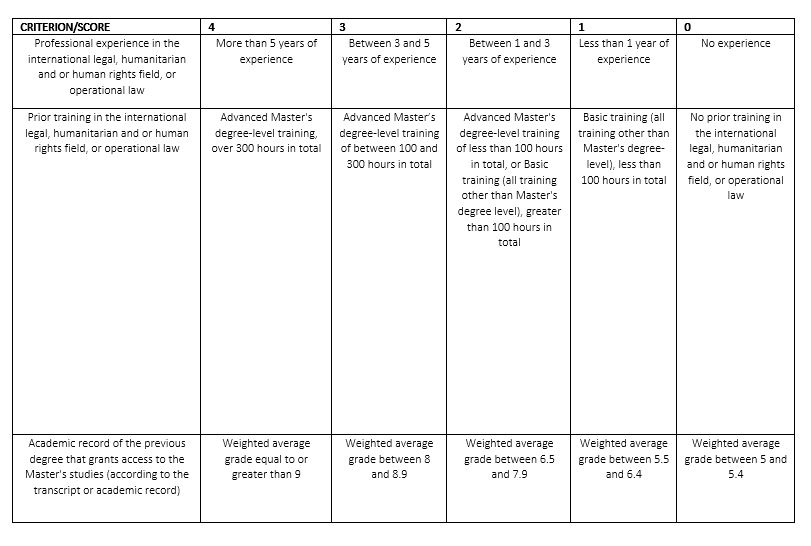
In the event of a tie, preference will be given to those students who have the highest score in professional experience in the international legal, humanitarian and human rights fields, or operational law, according to the criteria established for professional experience in the previous table (Table 4.1). In case of another tie, preference will be given to the student with the best weighted average grade in the academic record of the previous degree that grants access to the Master's studies.
Admission criteria
How to submit documentation necessary for admission.
In general, the admission documentation will be submitted to the Admissions Department.
The student must provide the originals or certified copies of the documentation presented, within a period established by the University, in order to formalize his/her enrollment. Any inaccuracy, falsity or omission of information, statement or document provided by the student in the admission period will determine the impossibility of continuing to exercise the right from the moment the University has proof of such facts, proceeding to the cancellation of the application for admission submitted and the place awarded, notwithstanding the criminal, civil or administrative responsibilities that may arise.
In order to access the official master's degrees, it is necessary to submit the following documentation:
- Completed admission application
- Identification document (D.N.I) or valid passport
- 2 passport-size photographs
- If necessary, a letter issued by the University in which the studies that grant access to the Master's degree in the country of origin
- Academic Record with the grades of the studies that grant access to the Master's degree
- Official Spanish university diploma
- Official diploma issued by a foreign higher education institution belonging to the European Higher Education Area (EHEA) that grants access, in the issuing country, to official master's degree studies
- Official diploma issued in a foreign educational system not belonging to the EHEA. In this case, access will be conditioned to the verification that the studies completed correspond to a level of studies equivalent to that of the official Spanish university degrees and that they grant access to the official master's degrees in the country in which the degree has been issued. This procedure does not imply, in any case, the homologation of the previous degree, nor its recognition for any purpose other than to access the master's studies
- Personalized letter of intent addressed to the Director of the Master's Program in which they explain the reasons why they want to study the Master's degree, as well as the academic and professional expectations that lead them to this choice
- Updated Curriculum Vitae
- Two recommendation letters
In the event that the studies granting access to the pre-registration of the Master's degree are completed in a Foreign Higher Education institution, both the diploma and the academic record (grades) must be official and issued by the competent authorities, in accordance with the legal system of the country of origin. In addition, they will have to fulfill the requirements that are indicated in detail in the "Access and admission procedure for Master_PO12" of the Teaching Organization Plan implemented by the University.
Admission process
In addition to the evaluation of the academic merits provided by the candidate, students must take the following tests, which are part of the admission process.
1.- Foreign language level test
Not applicable.
2.- Personal interview
This interview, which is carried out by the faculty or university advisors, is aimed at verifying the suitability of the candidate and his/her profile in relation to the degree. It is a matter of determining if the candidate has sufficient motivation, training and knowledge, abilities, aptitudes, communication skills, extracurricular activities and future interests necessary to be admitted as a student in the postgraduate degrees of Nebrija University.
Enrollment process
Once the student has been admitted, he/she will proceed to enrollment, following these phases:
Annual registration fees:
Candidates must reserve their place. This economic pre-enrollment guarantees the candidate's place at the University. These annual registration fees will not be returned except for students who are conditionally admitted, or do not fulfill the legal access requirements, or have a justifiable medical situation.
Enrollment:
Pre-enrolled candidates who wish to formalize their academic enrollment at the University must follow these steps within the established deadlines:
1.- Submit documentation: prove that he/she meets the requirements established by Spanish university legislation for admission to the Master's degree.
2.- Formalize the enrollment process online: The self-enrollment service on the Nebrija website allows admitted students to complete all academic, financial and administrative procedures within the established deadlines. To do this, they will receive, along with their letter of admission, the access code and personal password necessary to carry out their self-enrollment. Once self-enrollment is formalized, the candidate acquires the status of student at Nebrija University.
3.- Pay the enrollment fee for the academic year, according to the modality chosen by the student.
Deadlines for enrollment
1.- Enrollment will be done annually, the opening date will vary depending on the beginning of the Program. However, enrollment must be done at least one week before the start of the academic period.
2.- An extraordinary period will be opened on an exceptional basis for students who want to start their studies in the second semester, enrollment must be carried out before the completion of the second semester's partial exams.
Employability
Career Opportunities
- Civil servants of international organizations linked to the areas of human rights
- NGO workers in the field of human rights, humanitarian aid or development cooperation, as well as advisory work to them.
- Jurists who perform their professional work in transitional justice.
- National public function at all levels (State, autonomous and local), in international cooperation for development, in addition to promoting development and social integration in our own societies.
- Journalism professionals who wish to specialize in these subjects.
- Advice to companies in corporate social responsibility.
- Research and teaching in human rights, peace and sustainable development.
Internships
Protocols and Agreements
The university has a list of agreements with the most relevant institutions in the sector, which allow Master's degree students to use the knowledge acquired during their learning, as well as develop and discover their future activity.
Within the list of agreements maintained by the university, we highlight the following:
List of collaborating companiesTestimonials
University Life in International Humanitarian Law, Human Rights and Operational Law
Visit all the Activities of the School of Law and International Relations
Program Events and Activities
- Seminar “Changing role of the armed forces and their possibilities to mitigate and face new threats” (Inter-American Defense Board, Washington, D.C.)
- Lessons learned in Humanitarian Demining (Inter-American Defense Board, Washington, D.C.)
- LIX CICA International Conference. Security and Defense: Ethical and legal challenges in the face of current conflicts (Antonio Nebrija University, Madrid, Spain)
- Talk by the General Directorate of the Department of Homeland Security. Operational Intelligence. (Department of National Security, Spain)
- II International Symposium on Human Rights. A multidisciplinary approach. (Latin University of Costa Rica)
- Complex Current Affairs in Latin America: Contributions for a positive evolution (International Institute of Humanitarian Law, San Remo, Italy)
- Seminar on Women, Peace and Security (Inter-American Defense Board, Washington, D.C.)
- International Congress on Human Rights and Operational Law (Ministry of Defense of Colombia and Southern Command of the United States)
- International Congress on operational law and strategic intelligence. . (Antonio Nebrija University, Madrid, Spain)
- International Seminar "Dynamics of violence on the borders of Latin America" (Escuela Superior de Guerra of Colombia)
- International Forum “Approaches to International Humanitarian Law and Human Rights”. Antonio Nebrija University and the Integral Legal Department of the Colombian Army. Lecture: “Migrations in the gray area and the diplomatic crisis in the Mediterranean”
- Annual Master Class of the Higher School of Law in Brazil. Joint presentation of the Antonio Nebrija University with the Center for International Humanitarian Law of San Remo, Italy. “The new approach to risk and conflict analysis in security planning”
- International Forum on Strategic Intelligence and Operational Law. . Antonio Nebrija University, National Intelligence Center of Spain and Graduate School of the Colombian National Police.
Lecture "The Law in the time of Nebrija"
The conference "The law in the time of Nebrija" was organized by the Antonio de Nebrija Foundation together with the Faculty of Law and International Relations. Pérez-Bustamante's master class is part of the acts commemorating the V Centenary of Antonio de Nebrija.
Young Entrepreneurs Award
Contest in which its protagonists, pre-university students, have the opportunity to demonstrate their entrepreneurial capacity, creativity, organization and enthusiasm, through the definition and conceptualization of a business creation project.
Opening ceremony of the academic year
Opening ceremony of the academic year on the Madrid-Princess campus of Nebrija University.
Graduation Ceremonies | POSTGRADUATE
Postgraduate Graduation Ceremony of Nebrija University at the Life Sciences Campus in La Berzosa.
Conference for the Future of Europe (CoFoE) – NebrijaMUN
NebrijaMUN is a first class learning school. Students develop public speaking and debate skills, study foreign policy, as well as United Nations protocol and operating procedures.
Versus Debate League Final
Nebrija Versus is the first pre-university debate league to be held in the Community of Madrid, constituting a commitment from Nebrija University, which was born with the aim of projecting to society the image of a new generation of young people capable of shining through their talent, research capacity and communication skills.


